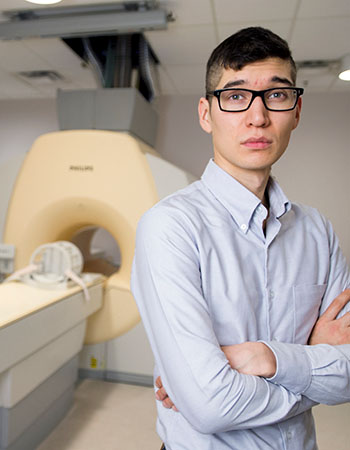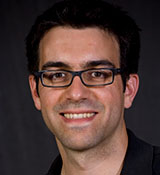What is Mathematics?
Mathematics has been termed the “queen of the sciences” because it is the principal language with which natural scientists communicate. Math will not only help you understand the world around you but will let you solve complex problems, spot patterns, think critically and analyze a wide array of data.Mathematics at Augustana
At Augustana, your lectures, seminars, and labs are taught in small classes. You'll develop relationships with your professors and peers to help you understand the subject matter and follow your interests. Our innovative programming means that you'll learn in new and exciting ways.
Program Information
Mathematics is available as a:
- Major in Bachelor of Science/Bachelor of Education
- Area of Study in Computing Science and Mathematics
- Minor in any program
Academic Innovations
All programs at Augustana include a wide-ranging arts and sciences core, taught within our unique “3-11” calendar
Careers
As the theoretical basis for all scientific disciplines, math is the desired subject of study in careers such as:
- Statistician
- Insurance Product Developer
- International Security Analyst
- Risk Analyst
- and many more!
Mathematics AlumnUS

Cancer Researcher
“If it weren't for my time at Augustana, I don't think I would be here now. They offered a smaller physics and math program, and I got to know my teachers pretty well. I was spurred on to find research projects.”
Course Highlights
Sets, functions, elementary propositional and predicate logic, Boolean algebra, elementary graph theory, proof techniques (including induction and contradiction), and combinatorics.
Introduction to cryptography in theory and practice, including its applications and mathematical foundations. Topics include classical cryptosystems, private-key cryptosystems (including DES and AES), hashing and public-key cryptosystems (including RSA), digital signatures, selected topics in cryptography.
Fundamental concepts of discrete and continuous dynamical systems, both linear and nonlinear; nonlinear differential equations; deterministic, nondeterministic, and chaotic dynamics; strange attractors and fractals. Applications in ecology, biology and physics.
Introduction to optimization (definition, notation and taxonomy); unconstrained optimization using gradient descent and stochastic gradient descent; linear programming: The Simplex Method; constrained optimization and Lagrange multipliers; convex optimization and quadratic programming.
Introduction to elementary probability theory and stochastic processes with a special emphasis on their applications in science. Topics include basics of probability, random variables, functions of random variables, random vectors, random processes and their classification, well-known random processes including the Bernoulli process, random walk process, Gaussian process, Poisson process, and Markov process.
Related Information

Thibaud Lutellier, PhD
Thibaud Lutellier teaches a range of computer science courses. His research interests are in the area of software reliability and artificial intelligence.
Visit their website
Gerhard Lotz, PhD
Gerhard Lotz teaches courses in all areas of physics and some areas of mathematics. His research involves trying to better understand the nature of the atomic nucleus.
Visit their website
Jeremy Sylvestre, PhD
Jeremy Sylvestre teaches a range of mathematics courses, with a focus on algebra. His main area of research is the representation theory of algebraic groups defined over a p-adic field.
Visit their website
Ha Tran, PhD
Ha Tran teaches a range of mathematics and computing sciences courses. Her research focuses on number theory and applications in cryptography and coding theory.
Visit their website